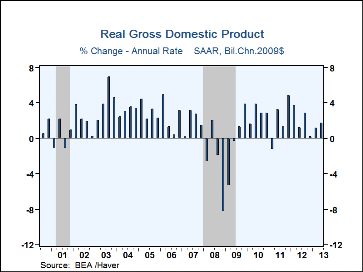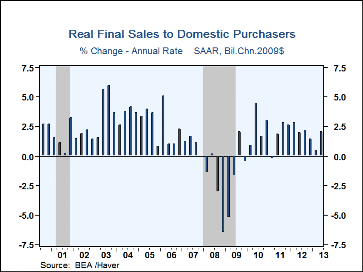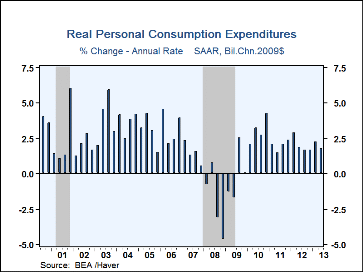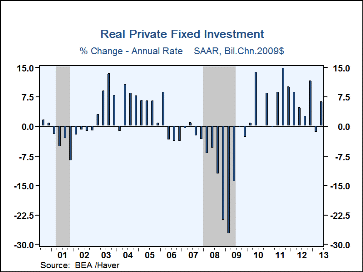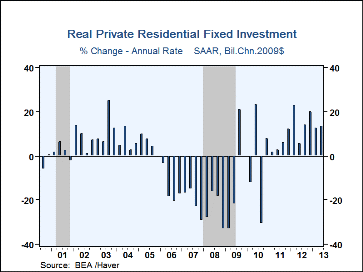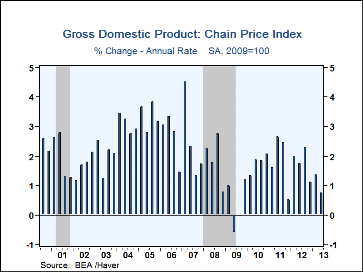 Global| Jul 31 2013
Global| Jul 31 2013U.S. GDP Growth Beats Expectations; Price Inflation Is Modest
by:Tom Moeller
|in:Economy in Brief
Summary
Economic momentum built last quarter. The 1.7% (1.4% y/y) advance in real GDP during Q2'13 was its strongest of the last three quarters. It also outpaced consensus expectations for a 1.0% rise. However, the advance was accompanied by [...]
Economic momentum built last quarter. The 1.7% (1.4% y/y) advance in real GDP during Q2'13 was its strongest of the last three quarters. It also outpaced consensus expectations for a 1.0% rise. However, the advance was accompanied by downward revisions to growth during the prior two quarters to 1.1% and 0.1% from 1.8% and 0.4%. That left the 1.0% average of growth during the last nine months at its weakest since Q3'09. Last quarter, strength in residential investment (14.9% y/y) continued to pace the economy's advance. Consumer spending rose at a steady 1.8% rate. Finally, revisions show that GDP growth during all of 2012 was an improved 2.8% versus 2.2% estimated earlier. Data back to 1929 were revised.
Personal consumption increased at a 1.8% rate (1.8% y/y) in Q2'13 but that was slightly diminished versus growth since 2011. Last quarter's gain was held back by a 0.4% decline (+6.7% y/y) in motor vehicle purchases. That followed three consecutive quarters of strong increase. A 7.2% rise (5.3% y/y) in furniture & appliances picked up some of the slack along with a 7.6% gain (3.1% y/y) in apparel spending. Business fixed investment rose 4.6% (2.4% y/y) and recovered its Q1 decline. The gain was led by an 11.4% advance (5.5% y/y) in information processing equipment. A newly developed concept showed that spending on intellectual property products grew 3.9% (4.0% y/y). Spending on software expanded 4.2% (6.2% y/y). Residential investment grew at a steady 13.4% rate (14.9% y/y) but government outlays slipped 0.4% (-2.0% y/y).
Inventory investment added 0.4 percentage points to GDP growth following a 0.9 point addition to Q1. Deterioration in the net export balance, however, countered that rise with a 0.8 point subtraction from growth. Exports grew at a 5.4% rate (1.4% y/y) but imports grew a faster 9.5% (1.8% y/y). Excluding these effects on GDP growth left final sales to domestic purchasers rising at a 2.0% rate (1.5% y/y), its fastest advance since Q3'12.
The GDP chain price index grew at a diminished 0.7% rate last quarter (1.4% y/y), its weakest rise since Q4'11. The PCE price deflator was unchanged (1.1% y/y), held back by a decline in energy prices. The price index for business fixed investment rose 0.9% (1.0% y/y) but the residential investment price index grew a firm 5.7% (4.8% y/y).
The latest GDP figures can be found in Haver's USECON and USNA databases; USNA contains basically all of the Bureau of Economic Analysis' detail on the national accounts, including the new integrated economics accounts and the recently added GDP data for U.S. Territories. The Consensus estimates can be found in AS1REPNA.
| Chained 2009 $, %, AR | Q2'13 | Q1'13 | Q4'12 | Q2 Y/Y | 2012 | 2011 | 2010 |
|---|---|---|---|---|---|---|---|
| Gross Domestic Product | 1.7 | 1.1 | 0.1 | 1.4 | 2.8 | 1.8 | 2.5 |
| Inventory Effect | 0.4 | 0.9 | -2.0 | -0.1 | 0.2 | -0.2 | 1.5 |
| Final Sales | 1.3 | 0.2 | 2.2 | 1.5 | 2.6 | 2.0 | 1.0 |
| Foreign Trade Effect | -0.8 | -0.3 | 0.7 | 0.0 | 0.2 | 0.2 | -0.5 |
| Domestic Final Sales | 2.0 | 0.5 | 1.4 | 1.5 | 2.4 | 1.8 | 1.5 |
| Demand Components | |||||||
| Personal Consumption | 1.8 | 2.3 | 1.7 | 1.8 | 2.2 | 2.5 | 2.0 |
| Business Fixed Investment | 4.6 | -4.6 | 9.8 | 2.4 | 7.3 | 7.6 | 2.5 |
| Residential Investment | 13.4 | 12.5 | 19.8 | 14.9 | 12.9 | 0.5 | -2.5 |
| Government Spending | -0.4 | -4.2 | -6.5 | -2.0 | -1.0 | -3.2 | 0.1 |
| Chain-Type Price Index | |||||||
| GDP | 0.7 | 1.3 | 1.1 | 1.4 | 1.7 | 2.0 | 1.2 |
| Personal Consumption Expenditures | 0.0 | 1.1 | 1.6 | 1.1 | 1.8 | 2.4 | 1.7 |
| PCE less Food & Energy | 0.8 | 1.4 | 1.3 | 1.2 | 1.8 | 1.4 | 1.3 |
Tom Moeller
AuthorMore in Author Profile »Prior to joining Haver Analytics in 2000, Mr. Moeller worked as the Economist at Chancellor Capital Management from 1985 to 1999. There, he developed comprehensive economic forecasts and interpreted economic data for equity and fixed income portfolio managers. Also at Chancellor, Mr. Moeller worked as an equity analyst and was responsible for researching and rating companies in the economically sensitive automobile and housing industries for investment in Chancellor’s equity portfolio. Prior to joining Chancellor, Mr. Moeller was an Economist at Citibank from 1979 to 1984. He also analyzed pricing behavior in the metals industry for the Council on Wage and Price Stability in Washington, D.C. In 1999, Mr. Moeller received the award for most accurate forecast from the Forecasters' Club of New York. From 1990 to 1992 he was President of the New York Association for Business Economists. Mr. Moeller earned an M.B.A. in Finance from Fordham University, where he graduated in 1987. He holds a Bachelor of Arts in Economics from George Washington University.


